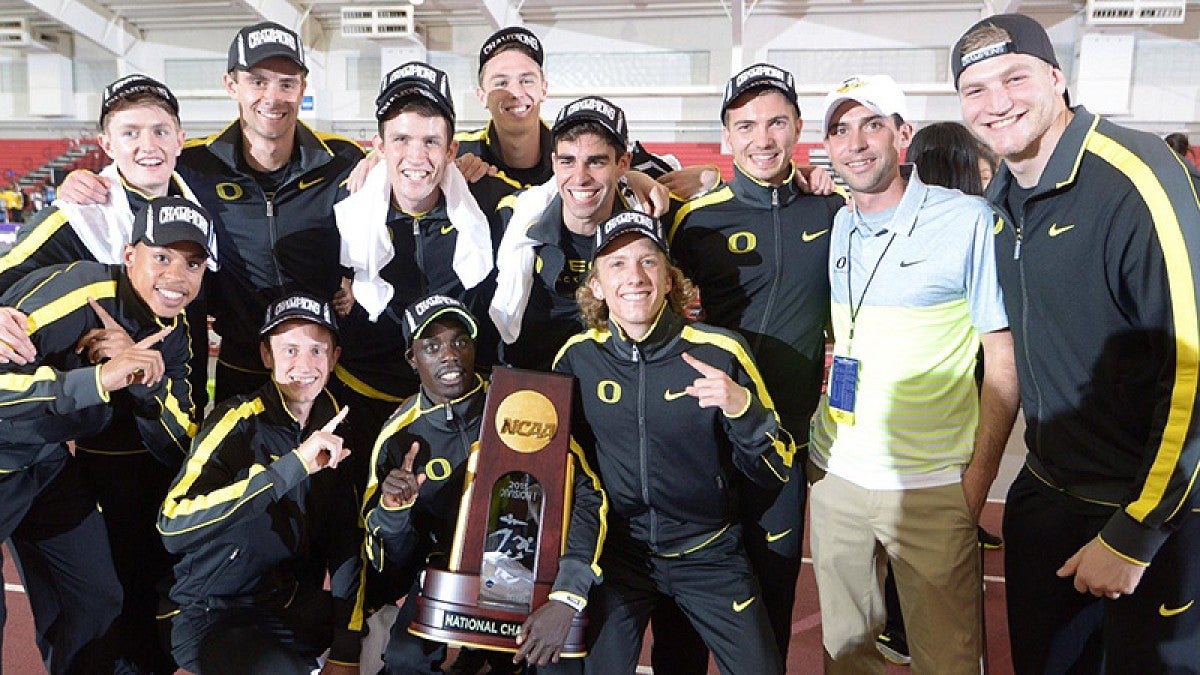Though bigger and brawnier, Greg Skipper fit right in with the rest of the Oregon men's contingent at this weekend's NCAA Indoor Track and Field Championships.
Sure, the weight thrower was the only Man of Oregon in the field events. But that didn't make him an outsider on a team loaded with distance runners. "I could walk a 3,000," Skipper playfully suggested Saturday, after the Ducks had wrapped up their second straight NCAA title. "In probably, like, 15, 20 minutes."
More than anything, Skipper's attitude and work ethic were aligned with Oregon's milers, 3,000-meter runners and 5k entrants. Those traits helped the Ducks pile up a remarkable 74 points Friday and Saturday, with four from Skipper's fifth-place finish and a remarkable 70 from the middle-distance and distance runners.
"The atmosphere is incredible, being with these guys," Skipper said. "Our distance guys, they all come in and work hard, take care of their job, and you want to perform as well as you can to do as well as those guys. I think it motivates everyone on the team."
On Saturday, they carried the Ducks all the way to another NCAA Indoor championship, their third all-time. The evening was capped by the 3,000 meters, in which Oregon tied another meet record with five entries.
Entering the race, the Ducks needed just 11 points to clinch the team title. With the top qualifier in Eric Jenkins, and four capable teammates, UO coaches could have done little else than set up Jenkins or Edward Cheserek for the win and trust that another Duck would account for meet-clinching points.
But rather than have Jenkins or Cheserek stalk the field and use their transcendent closing speed to win, UO assistant coach Andy Powell plotted a different path. He had Jenkins run from the front, pushing the pace. That minimized the chances a strong kick would win the race, and provided an opening for teammates such as Parker Stinson or Jeramy Elkaim to grind their way onto the podium.
It didn't come to pass — Stinson finished ninth, one spot shy of scoring — but it fit with Oregon's team-first philosophy. "It would have been really cool to be on the stand with these guys," said Stinson, who was making his final appearance with the Ducks. "But just training with them and being in that race with them was special enough. Just happy I could have a race I could be really proud of at the end."
Early in the 3,000, runners from Virginia Tech and Penn State broke free from the pack. As Jenkins reached the backstretch with 11 laps to go, Powell told him to reel in the breakaway runners, though at a methodical pace.
Jenkins was coming off a win in the 5,000 a day before, but he was game. "You're always a little concerned when you've got a race in your legs," Jenkins said. "But as soon as it gets down to race time, you've got to push that aside. You've got to focus on the race, and really just focus on the task at hand."
Midway through the race, Stinson and Cheserek were stalking the field, while Elkaim and Will Geoghegan were up with Jenkins. Stinson and Cheserek began to move up, while Elkhaim faded. With 800 meters left, Stinson had dropped off as well, but Jenkins and Cheserek were 1-2, and Geoghegan was near the front too.
Jenkins would pass Cheserek in the homestretch for the win, and Geoghegan kicked into third. Stinson was a place away from scoring, while Elkaim succumbed to lingering Achilles discomfort and was 16th.
"Not everybody can have the best race in one day," Elkaim said with a wide smile. "It was tough for me, but we're national champions; how could I be upset about that? We went 1-2-3. I'm just stoked to be a part of this team right now."
The day began for the Oregon men with the mile, and an audacious move by a Montana State runner that earned a tip of the cap from the Ducks — and a resounding response from Cheserek. Montana State's Cristian Soratos, fearing Cheserek's kick, tried to do the same thing in the mile that Jenkins did later in the 3,000, pushing the pace early to eliminate the threat of a kick.
But Cheserek was more than comfortable turning on the jets early to stay with Soratos and a third runner in the lead pack. And Cheserek kept plenty left in the tank to race past him for the win.
Back with the main pack were Johnny Gregorek and Daniel Winn of Oregon, who realized Soratos' strategy too late. "As soon as those guys took off it was like, 'all right, work with this pack,'" Gregorek said. "That became my race, so to speak."
That mature, controlled approach paid off — Gregorek won the race of the main pack, finishing fourth. Winn took sixth, with the same measured race plan. "There were still a lot of points left once those three guys went," Winn said.
Despite his amazing performance in the mile, Cheserek came back an hour later and was in position to win the 3,000. When Jenkins passed him in the homestretch, some wondered whether Cheserek ceded victory to his teammate, a notion Cheserek didn't dispel. "We're not rivals," he said. "So we just tried to score as many points as we can."
That attitude resulted in the Ducks matching the most team points scored since Arkansas' record 94 in 1994, and the largest margin of victory (24) since 2003. The NCAA Indoor championship was delivered primarily by Oregon's talented distance crew, but it was a team approach that fueled their run to the title.
—By Rob Moseley, GoDucks.com


